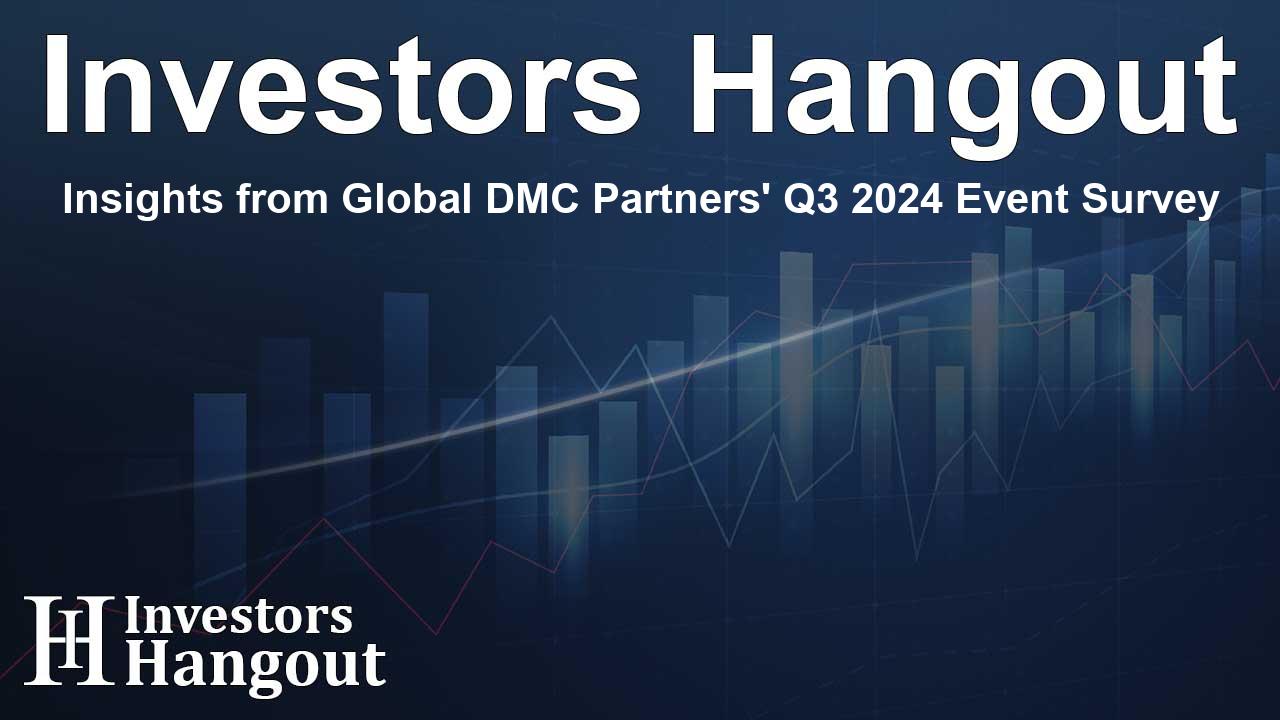Insights from Global DMC Partners' Q3 2024 Event Survey

Key Findings from Global DMC Partners' Event Survey
The Meetings, Incentives, Conferences, and Exhibitions (MICE) industry continuously evolves, especially in the face of persistent economic challenges. Global DMC Partners (GDP), a leading network of independent Destination Management Companies, recently published the Q3 2024 Meetings & Events Pulse Survey results. This insightful survey captures the perspectives of event professionals, shedding light on the current state of the industry.
Budget Disparities in the MICE Industry
One of the primary themes uncovered in the survey is the significant budget disparities encountered by planners globally. International planners reported only 27 percent experiencing any budget increases, in stark contrast to 44 percent of their U.S. and Canadian counterparts. This discrepancy highlights the challenges faced by planners outside North America.
The Impact of Inflation
Those fortunate enough to secure budget increases often find that these additional funds do not stretch far. A notable 57 percent of planners with budget hikes saw increases between 10 to 20 percent. Unfortunately, this barely compensates for inflation, leaving planners with diminished purchasing power. Such constraints may squeeze out creative or experiential elements from events.
Rising Costs: An Unstoppable Challenge
Persistent rising costs continue to be the top concern for event planners—a trend that has persisted since late 2022. The most impacted areas include accommodations, food and beverage (F&B), and audiovisual (A/V) services. Approximately 80 percent of respondents grapple with escalating accommodation rates. Additionally, over 70 percent frequently encounter higher A/V costs during event planning.
Strategies for Budget Management
In response to these financial challenges, many planners have turned to innovative strategies. This includes having transparent budget discussions with clients and making tough decisions like reducing A/V expenditure or shortening event durations. Others have consolidated events or utilized early contracting to optimize costs.
Technological Innovation in Event Planning
The adoption of technology and AI is transforming the planning processes in the MICE industry. Last year, only 30 percent of planners reported using AI regularly in their work. Fast forward to today, nearly half of the respondents utilize AI tools like ChatGPT and Microsoft CoPilot frequently. This shift not only streamlines planning but also enhances the overall event experience.
Lead Times and Planning Challenges
Another critical finding indicates that event lead times are becoming more compressed. Around 43 percent of planners reported an average planning window of only four to nine months. This presents additional hurdles in ensuring successful events. In light of these time constraints, 26 percent indicated they could only finalize plans within 10 to 12 months, a slight increase from previous surveys.
Sustainability in the MICE Industry
As awareness of environmental issues grows, sustainability practices are becoming integral to event planning. The survey revealed that international planners are more likely to adopt these practices than their U.S. peers. While only seven percent of U.S. organizations seamlessly incorporate sustainability, 31 percent of international respondents report habitual integration of these practices. Measures taken include sourcing local food and reducing plastic waste.
Concluding Thoughts
The survey from Global DMC Partners paints a nuanced picture of the current state of the MICE industry. With a mix of budget challenges, rising costs, and the transformative role of technology, planners must navigate a complex landscape. By embracing innovation and focusing on sustainable practices, the industry can move towards a brighter future.
Frequently Asked Questions
What are the main challenges faced by event planners today?
The main challenges include rising costs, budget management, limited availability of venues, and slow approval times from decision-makers.
How significant are budget disparities among international planners?
There are marked budget disparities; only 27% of international planners reported budget increases compared to 44% of U.S. planners.
What role does technology play in modern event planning?
Technology, particularly AI, enhances efficiency and decision-making, with nearly half of planners using AI tools regularly.
How are sustainability practices being integrated into event planning?
Planners incorporate practices like sourcing local food and reducing plastic waste, with more international planners adopting these measures compared to U.S. planners.
What were the findings regarding event lead times?
Event lead times remain compressed, with many planners working within four to nine months to finalize their plans.
About Investors Hangout
Investors Hangout is a leading online stock forum for financial discussion and learning, offering a wide range of free tools and resources. It draws in traders of all levels, who exchange market knowledge, investigate trading tactics, and keep an eye on industry developments in real time. Featuring financial articles, stock message boards, quotes, charts, company profiles, and live news updates. Through cooperative learning and a wealth of informational resources, it helps users from novices creating their first portfolios to experts honing their techniques. Join Investors Hangout today: https://investorshangout.com/
Disclaimer: The content of this article is solely for general informational purposes only; it does not represent legal, financial, or investment advice. Investors Hangout does not offer financial advice; the author is not a licensed financial advisor. Consult a qualified advisor before making any financial or investment decisions based on this article. The author's interpretation of publicly available data shapes the opinions presented here; as a result, they should not be taken as advice to purchase, sell, or hold any securities mentioned or any other investments. The author does not guarantee the accuracy, completeness, or timeliness of any material, providing it "as is." Information and market conditions may change; past performance is not indicative of future outcomes. If any of the material offered here is inaccurate, please contact us for corrections.